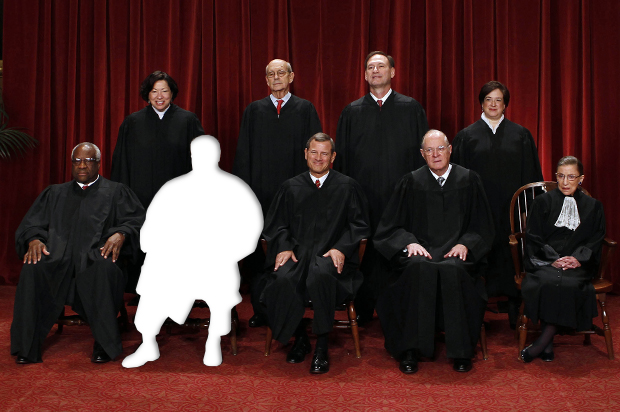Faced with the growing reality that the Republican Party is likely to lose the White House for the third presidential election in a row, Senate Republicans are growing ever bolder in their vows of continued obstruction — openly pitching continued Republican control of the upper chamber as the only way to ensure that the late Supreme Court justice Antonin Scalia’s successor is never selected by a Democratic president.
On Tuesday, Sen. Richard Burr of North Carolina was forced to apologize after audio of comments he made about Democratic presidential nominee Hillary Clinton at an event Saturday were published. Burr joked that he was heartened by an image of Clinton covered with a bullseye on the front of the NRA’s monthly magazine.
“The comment I made was inappropriate, and I apologize for it,” Burr wrote in a statement provided to The News & Observer, a North Carolina newspaper which the Senator, locked in a tough reelection battle, had earlier blocked from receiving campaign notices.
But Burr’s apology apparently did not cover his equally outrageous comments about his plans to refuse his constitutional role to provide advice and consent for the president’s judicial appointments.
“If Hillary becomes president,” Burr vowed to Republicans at the get-out-the-vote rally Saturday, “I’m going to do everything I can do to make sure that four years from now, we’re still going to have an opening on the Supreme Court.”
While Burr’s rhetoric about political violence directed at rivals grabbed headlines for its recklessness, his vow to keep up the GOP’s modern tradition of obstinate obstruction rather than loyal opposition was just as dangerous. Burr’s comments built upon pronouncements made by the likes of Sens. Ted Cruz and John McCain in recent weeks, as Donald Trump’s beleaguered presidential campaign has threatened to flip the Senate to Democratic control with a potential wave election that could wipe out vulnerable Republicans in swing states.
Burr is in a statistical dead heat with Democratic challenger Deborah Ross, according to the Real Clear Politics average of polls.
Last week, Texas Republican senator and failed presidential candidate Ted Cruz argued to reporters that there was historical precedent for the Republicans’ months-long refusal to hold hearings on Merrick Garland, President Obama’s Supreme Court nominee.
Cruz’s case for continued obstruction came just days after Arizona Sen. John McCain, also facing a competitive Democratic challenger this cycle, told a Pennsylvania radio station that Republicans would be “united against any nominee” put forward by Clinton in the event she wins the presidency.
Meanwhile, the conservative Heritage Foundation is fundraising off the threat that a Clinton win will result in “a court-packing plan to load the Supreme Court with radical leftists who would dominate the judicial branch for a generation”:
No matter who wins the November election, liberals want to use the “lame duck” session of Congress to push through a vote on President Obama’s Supreme Court nominee, Merrick Garland. Depending on the election, the next Supreme Court pick could be even more liberal!
Asking for donations, Heritage offered to “give Senators the procedural tools to block any liberal nominee.”
This is all an example of Republicans moving the goalposts. After Scalia died in February, with nearly a year left in Obama’s second term, Senate Majority Leader Mitch McConnell said the vacancy “should not be filled until we have a new president.”
In a statement released hours after news of Scalia’s death had broken, McConnell insisted that “the American people should have a voice in the selection of their next Supreme Court justice.”
Cruz similarly tweeted that the Senate owed it to Scalia to wait nearly a year for the next president to select his successor:
Justice Scalia was an American hero. We owe it to him, & the Nation, for the Senate to ensure that the next President names his replacement.
— Ted Cruz (@tedcruz) February 13, 2016
With that, Republicans allowed the Supreme Court to operate with only eight justices (resulting in several important cases being kicked back to lower courts) for months, while it became clear that Trump would become their party’s nominee and would likely lose the fall election.
Facing widespread defeat at the ballot box next week, Senate Republicans are singing the same tune of “do-nothingness” they sang in the early days following Obama’s historic election.
“I would much rather have eight Supreme Court Justices than a [ninth] Justice who is liberal,” Sen. McCain said a debate earlier this month.
According to The New Yorker, Senate Judiciary Committee Chairman Chuck Grassley recently suggested that if a GOP-controlled Senate vocally opposes a Clinton nominee, confirmation hearings would only be a waste of time and taxpayer money:
The blockade of Garland is looking more and more like an “opening act,” as Carrie Severino, the chief counsel of the conservative Judicial Crisis Network, described it to the Washington Post back in February. Republicans have been emboldened by their success in shutting down the Garland nomination. So have several conservative interest groups, such as J.C.N., that play a big role in the politics of judicial appointments. Heritage Action, another such organization, recently issued a fund-raising appeal touting its success in “stiffen[ing] the spines” of senators. The Garland freeze-out, the letter reads, has “proven we can win on this issue” — that is, stopping liberal nominees. Establishment Republicans, too, are on board with this strategy. Last week, a lawyer who served in senior roles in the Administrations of Ronald Reagan and George H. W. Bush told me that he has participated in conversations in which “Republicans of a philosophically conservative bent — not the movement people, but the Federalist Society types, the intellectuals — [expressed] worry that the Supreme Court is slipping away. They are saying to each other, ‘If only the Republican leadership had balls, it would simply say no to any nominee.’ ” What they want, this lawyer added, is for senators to say, “We have the constitutional right to advise and consent, and we are not consenting.”

